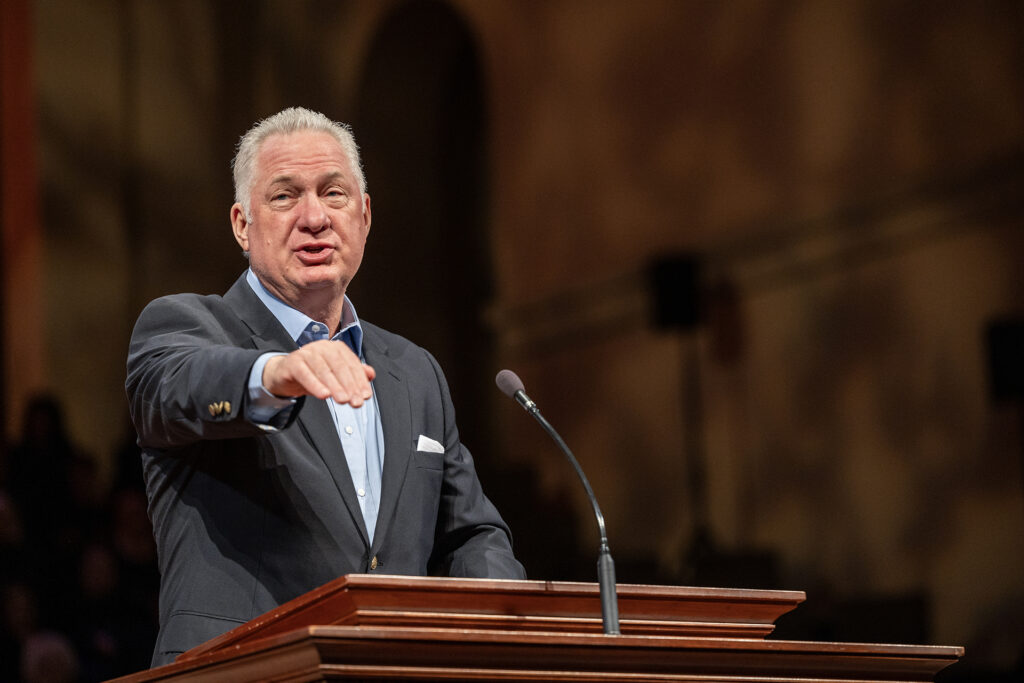The International Mission Board needs churches. Missionaries can’t get to the mission field without churches, and churches enable missionaries to remain in the places God called them to serve. Churches also play a crucial role in raising up a new generation of missionaries.
Jeff Ginn, vice president of mobilization for the IMB, said the role and goal of the mobilization department is to encourage and equip more churches and Christians to engage in the missionary task.
“Mobilization seeks to awaken the church to pray more, to give more, to go more, and to send more,” Ginn said. “We’re resolved to address the world’s greatest problem.”

Jeff Ginn, IMB vice president of mobilization, sees church partnerships as vital to reaching the nations with the gospel. “We need you. We can’t do this alone,” Ginn says to local churches. IMB Photo
Among its many functions, IMB’s mobilization office develops church partnerships and encourages Southern Baptists to take short-term mission trips. A NextGen team is dedicated to mobilizing students from churches, universities and seminary campuses. Another team is engaged in mobilization among ethnic congregations.
Romans 15:24 is a crucial verse in Ginn’s understanding and application of church mobilization. In the verse, Paul tells the church in Rome, a church he hadn’t visited yet, “I hope to see you on my way to Spain and have you help me get there.”
Ginn says, “That text is so precious because it points to the local church and its importance in the mission. Three words come to mind from it that relate to mobilization from the IMB’s perspective: hope, heading, and help.”
Paul hoped to visit church members on his way to the mission field of Spain so he could impart spiritual gifts and be encouraged by their gifts. He knew where he was heading on the journey, the destination where God was leading him.
“For Paul, he still kept his heading set — I’m going to Spain, that’s where the unreached people are, but I’m going to go by the local church on my way to get there,” Ginn said.
In addition to Paul’s desire to be enriched by their fellowship, he needed their help. Ginn notes that Paul expresses his expectation that the church will help him in his journey.
It is the IMB’s hope to continue to build relationships with churches. IMB missionaries are heading to the mission field to engage unreached people groups and need the church’s help, Ginn said.
“We need you. We can’t do this alone. The Great Commission was given to the local church. And we’re here to serve Southern Baptists in getting the gospel to the ends of the earth,” he said.
Pastors are integral to mobilizing the church.
“A church reflects the heart of her pastor,” Ginn said. “The pastor puts his imprint on the church. What he emphasizes, the church will emphasize, what he deemphasizes, the church will deemphasize.”
“You show me a pastor who loves missions, who goes on mission trips, who promotes missions, and I’ll show you a church that loves missions, goes on mission trips, promotes missions, gives to missions, and prays for missions,” he said.
One of the ways churches can mobilize their church members is through creating pipelines.
The IMB uses the term “pipeline” for people who are in the process of considering and preparing to serve as missionaries. Churches are using the term in reference to their own missionary preparatory processes. The localization of the missionary pipeline is gaining momentum, Ginn said.
It’s Ginn’s hope that churches will adopt the Acts 1:8 model, “You’ll be my witnesses in Jerusalem, Judea, Samaria, and to the uttermost parts of the earth.”
He said churches can mobilize their members to be involved in missions locally, then engage in a state missions effort, then take a national mission trip and then move to an international mission trip.
Ginn, who served with his family in Latin America as an IMB missionary, said it was the mobilization efforts and Acts 1:8 vision of his childhood home church that influenced his later decision to become a missionary.
This spring, the IMB will host a Sender’s Summit, where leaders from four ministries that are excelling at mobilizing their constituencies will share their methods to encourage other churches to be on mission.
Register now for the Sender’s Summit.

